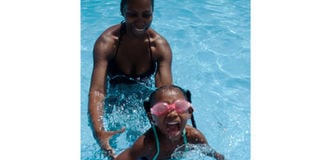Swimming is a great skill, exercise

Teaching your child to swim might just save their life one day. PHOTO/NET
Although some people can swim, others fail to learn for one reason or another, with the main one being the fear of water (hydrophobia). For those who do not know how to swim, why not invest in learning not only for your safety but also for the numerous health benefits that come with swimming.
Life saver
Learning to swim is vital to your personal safety as you never know when you may unexpectedly end up in the water.
“The common reason why most people drown is because they cannot swim,” Simon Lukoya, a swimming coach says, adding, “Someone falls into the water, they panic or instantly become afraid of the water and before you know it, they are drowning.”
Rather than fear it, Lukoya says water requires one to be confident and relaxed.
Drowning many times involves water entering through the mouth and nose forcing an individual to gasp for air.
According to the World Health Organisation, it is the third leading cause of unintentional injuries worldwide with individuals who have increased access to water being most at risk.
Health benefits
Dr Isaac Kakooza, a general practitioner, says because swimming requires a lot of muscle work in order to move in water, the skill, in the end, strengthens the muscles and enables one to have a flexible body.
“The increased muscle strength and flexibility is because of the continuous stretching, pulling and kicking as one swims,” he says, adding, “It is like an overall workout since one is utilising every part of their body.”
Kakooza also says that swimming makes the heart stronger, by making it more efficient in pumping blood and in the end, leading to better blood flow throughout the body.
He adds that swimming also builds endurance, is a therapy treatment for some body injuries and provides a satisfying feeling when cooling down on a hot day. But also, notably, swimming can boost one’s self-confidence, physically and in water.
Learning tips
Joseph Barungi, a swimming coach and instructor, advises anyone interested in learning to swim to always seek the services of a professional coach.
“A coach will also take you through the basics. They will teach you important techniques such as gliding, floating on water, holding your breath, maintaining a streamlined position and different swimming styles, among other things,” he says.
As much as some individuals prefer to learn without the help of a professional swimming coach, Barungi says it is risky to try learning to swim without the assistance of a professional coach.
“The importance of a professional coach is not only to teach but also ensure your safety while training. For instance, in case you encounter a problem during a particular lesson, they will immediately come to your rescue,” he says.
Barungi concludes by saying that anyone can learn how to swim regardless of their age.
“You just need to be determined and focused,” he says.
Reduce Pain
According to swimschoolaustin.com, an online portal, elderly individuals often avoid several forms of exercise due to pain when they move.
Swimming will reduce pain during motion as the water helps to prevent excess strain on the body. Water is a natural cooling element, which reduces pain while moving stiff joints and sore muscles.
OTHER IDEAS
Knowledge is power, and adding a new skill to your life not only improves your confidence, it could even help you professionally. If you work for a company that provides corporate events, cruises, and other fun things, you can find yourself in the middle of an awkward situation if you cannot swim. Learning how to swim is a great way to enhance your skills and enjoy your life.




